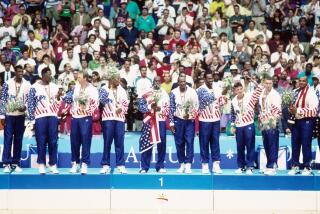Even Soviets Not Certain They Can Keep Sabonis From NBA After Olympics
- Share via
KAUNAS, U.S.S.R. — Arvidas Romas Sabonis, the Lithuanian basketball star drafted by the Portland Trail Blazers this year, says he wants to play in the National Basketball Association.
And the coaches and officials who watch with awe as the 7-foot-3 center maneuvers into sports history seem to view his departure for the American professional ranks as inevitable once the 1988 Olympic Games in Seoul are over.
But neither Sabonis nor his coaches would go into detail about the conditions under which he could sign an NBA contract.
There’s no precedent for a Soviet sportsman to play abroad, except by defecting. But the coaches and officials working with Sabonis seem to acknowledge that it will be hard to keep him interested in amateur competition for the rest of his playing career.
Sabonis, known to his friends and teammates as Romas, has the demeanor of a sports superstar and has accumulated all the trappings of success that rubles and socialism can provide: a country cottage, a Soviet compact car with license plates to match his team jersey, and the adoration of millions nationwide.
But the 21-year-old knows he could be earning half a million dollars a year in the NBA.
“Of course I’m interested,” Sabonis told The Associated Press in a rare interview in his hometown, where he has already played five years at the highest level of competition the Soviet system offers. “Who doesn’t want to play as a professional?”
Sabonis knows about the accolades from sports officials worldwide who have seen him play for Zhalgiris in the 12-team top amateur league or on the Soviet national team, which made him the starting center at the age of 17.
U.S. Olympic Coach Bob Knight once called Sabonis potentially the best player in the world, and he has already been acclaimed the best in Europe.
He dislikes interviews, striking a pose of obvious boredom and grunting out monosyllable answers during questions about his childhood.
But he perks up when talk turns to his opportunities abroad.
“Basketball in America is great. That’s where it was born. There’s a lot to be learned there,” Sabonis said.
Yes, he knows that the Trail Blazers spent their first-round pick on him. Yes, he knows the difference between the lifestyles of amateur players and the professionals.
“You’re talking about the money, right?” he asks, nodding appreciatively as a broad grin breaks through. “I like it.”
Sabonis says he doesn’t know if he would like living abroad, as he’s never lived anywhere but in the apartment he shares with his parents and younger sister and brother.
“Traveling is one thing, living there is another,” he said. “But if it’s possible, I’d like to try it.”
He has no apparent preference for where he would like to play, although he says he likes warm weather.
“I just need to play. I want to play. What difference does it make where?”
Zhalgiris Coach Vladas Garastas, who has trained Sabonis for six years, said his protege wants to play in the Olympics.
“He was too young for the Moscow Games, and for Los Angeles, well, we just didn’t go,” Garastas said. “He’s very young. What will happen after Seoul, we’ll have to see.”
Robertas Rukaitis, a former Zhalgiris player and currently deputy director of the 80,000-member sports club, talks about Sabonis with undisguised awe.
“He’s incredible,” Rukaitis said. “He’s got mobility that’s unparalleled even among much shorter players.”
Garastas and Zhalgiris director Semionas Tokeris were asked whether they consider Sabonis, who was eight when he appeared at their sports club, an NBA-class player.
“It goes without saying,” Garastas replied.
Rukaitis credits Sabonis with sparking a surge of interest in basketball among the 3 million people in this Baltic republic.
“Almost every kid plays basketball now. We can’t keep up with the demand for facilities. Even my little son knows who Sabonis is,” Rukaitis said.
More to Read
Go beyond the scoreboard
Get the latest on L.A.'s teams in the daily Sports Report newsletter.
You may occasionally receive promotional content from the Los Angeles Times.






